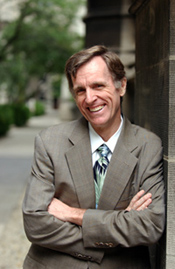 |
|
|||||||||
| The Zen of Education
The place: Rockefeller Chapel. The event: the annual “Aims of Education” address to College first-years. The conclusion: education has no aims. Welcome to the University of Chicago.” Of the dozens of persons who will say that to you during orientation week, I am the only one who will keep on talking for another 60 minutes after saying it. I imagine that you have heard few such orations before and that you will hear few hereafter. A full-length, formal talk on a set topic is a rather 19th-century kind of thing to do. Even at Chicago, this is the sole such oration you will get. You will be glad to know that when you graduate four years hence, the speaker is asked to speak for exactly thirteen and one-half minutes. It’s no easier for me. This is only the third or fourth such oration that I’ve given in my life. And you’re not an easy audience. You’re preoccupied with new roommates, placement tests, and “Chicago Life meetings” numbers one through five. Your minds are weary with the endless junk we’ve given you to read. Your bodies are aglow with adrenaline, serotonin, and endorphins, not to mention the more urgent excitements of estrogen and testosterone. Some of you are eager to hear what I have to say. Some of you can’t wait till it’s over. Some of you are watching the noisy dude whisper loudly two rows in front of you. Some of you are sensing the aspiration and grandeur expressed by this Gothic building. Some of you are thinking that I, the speaker, have a very big nose. In short, you’re a diverse lot and I’m a beginning orator and we have an hour together to think about the aims of education. Let’s do it. There is a strong case to be made that, given who you are and where you are, there is no particular necessity for you to study anything for the next four years. First, as far as worldly success is concerned, you’ve already got it. That your future income will be huge and your future work prestigious can be predicted from the simple fact that you got into an elite college. About 2.8 million people graduate from high school every year; 1.8 million start college; 40,000 to 60,000 go to elite schools like Chicago. So you and your peers represent the top 2 percent of an 18-year-old cohort. Obviously you’re going to do very well indeed. All of this tells me that nearly everyone in this room will end up, 20 years from now, in the top quarter of the American income distribution. I have surveyed those who graduated from Chicago in 1975—a group considerably less privileged by ancestry than yourselves—and can tell you that their median personal income is about five times the national median, and their median household income is at about the 93rd percentile of the nation’s income distribution. That’s where you are headed. As far as the nationwide success game is concerned, there’s no reason for you to study here. The game is over. You’ve already won. “Surely,” you tell me, “my studies at Chicago will determine whether I’m in the 94th or the 99th percentile of income. Getting a fine higher education may not affect my gross chances of worldly success but surely they affect my detailed ones.” On the contrary. There’s no real evidence in favor of this second reason to get an education and a good deal of evidence against it. All serious studies show that while college-level factors like prestige and selectivity have some independent effect on later income, most variation in income happens within colleges—that is, between the graduates of a given college. That internal variation is produced by individual factors like talent, resources, performance, and major. But even those factors do not determine much about your future income. For example, the best nationwide figures I have seen suggest that a one-full-point increment in college GPA—from 2.8 to 3.8, for example—is worth about an additional 9 percent in income four years after college. That’s not much result for a huge amount of work. The one college experience variable that does have some connection with later worldly success is major. But most of that effect comes through the connection between major and occupation. The real variable driving worldly success, the one that shapes income more than anything else, is occupation. Within the narrow range of occupation and achievement that we have at the University, there is no strong relation between what you study and your occupation. Here is some data on a 10 percent random sample of Chicago alumni from the last 20 years. Take the mathematics concentrators: 20 percent software development and support, 14 percent college professors, 10 percent in banking and finance, 7 percent secondary or elementary teachers, and 7 percent in nonacademic research; the rest are scattered. All the science concentrations lead to professorships and nonacademic research. And biology and chemistry often lead to medicine. But there are many diversions from those pathways. A biology concentrator is now a writer, another is now a musician. Two mathematicians are lawyers, and a physics concentrator is a psychotherapist.
As for the humanities, the English majors have scattered to the four winds: 11 percent to elementary and secondary teaching, 10 percent to business occupations, 9 percent to communications, 9 percent to lawyering, 5 percent to advertising. Of the philosophers, 30 percent are lawyers and 18 percent software people. Two English majors are artists and one is an architect. A philosophy major is a farmer and two are doctors. With the exception of those planning to become professors in the natural sciences, there is no career that is ruled out for any undergraduate major. You are free to make whatever worldly or otherworldly occupational choice you want once you leave, and you do not sacrifice any possibilities because you majored in something that seems irrelevant to that choice. There is no national evidence that level of performance in college has more than a minor effect on later things like income. And in my alumni data, there is no correlation between GPA at Chicago and current income. The third reason for getting a college education is that it will give you foundational cognitive skills for later life. Since this is the argument that I have myself made most strongly in the past I shall take special care to demolish it.
What people have in mind here in the first instance are simple verbal and quantitative skills, advanced reading and speaking abilities that will help you deal with a knowledge economy, and quantitative training that will enable you to make reasonable financial choices and that will prove useful in area after area of professional endeavor. Beyond these lie more advanced skills: critical reading ability to see through the lies of newspapers and stock prospectuses, analytic ability to formulate complex programs of action at work, writing ability to make your ideas clear to your peers, independence of mind to free you from others’ views, and capacity for lifelong learning to deal with the changing needs of work and enjoyment. There is much evidence that Chicago alumni, alumni of equivalent schools, and national alumni samples all believe deeply that such general skills constitute the crucial learning in their college experience. Alumni always note the loss of detailed knowledge from college, while they always emphasize their retention of general skills. But the evidence that college learning per se produced these skills is flimsy. While we know that people acquire these skills over the four years they are in college, we are not at all clear that college instruction produces them. First, the kinds of young people who go to college, and to elite colleges, are quite different from those who do not. If in our analyses we do not have perfect statistical control for those differences, college may appear to have effects that in fact originate in the differences between those who go to college and those who don’t. To this selection bias effect, we can add the equally difficult problem of unmeasured variables. College students are likely to have more challenging jobs than students who don’t go to college. They spend more time hanging out with smart people. They live in an environment where cognitive skills are explicitly valued. Moreover, since many cognitive skills cannot be shown to differ seriously between those who have experienced college and those who have not, much of the skill increase could come from simple maturation. You could get more skilled just because you’ve lived a few more years. Our belief that college education has cognitive importance rests pretty completely on our belief that we can statistically solve the problems of selection bias and unmeasured variables, because the only nonstatistical way of handling them is controlled experiment. No one has ever taken 1,000 bright, ambitious young people and sent them not to college but to another, equally challenging, intellectual environment that did not involve classroom instruction, courses, or curricula. Suppose you could spend the next four years going through a structured rotation of working internships in businesses, not-for-profits, and government agencies, where you would be left to pick up skills the same way everybody else there does: by asking friends and coworkers what to do, by reading a manual, or by going to some organizationally sponsored classes on particular necessary techniques. You might still live in dormitories. You might still have an extracurricular life. But there would be no classroom instruction. I submit that in all but a few areas—the hard sciences and perhaps engineering—you would be every bit as ready for law school or business school or management consultancy or social-work training as you will be after your four years in classrooms here. That this is likely to be true seems clear from the statistical evidence we do have about the net effects of college study. First, there is no consistent evidence for a substantial net effect (say a 20 percent or more positive effect) of college instruction on oral communication skills, written communication skills, general reflective judgment, or intellectual flexibility, although there is moderate evidence for minor effect in all these areas. Second, there seems to be consistent evidence that college instruction has a medium-sized effect (about 10 to 15 percentage points) on general verbal and quantitative skills. But this seems to be a matter of “use it or lose it.” College makes you keep using the skills learned in high school, whereas many forms of employment don’t. Finally, college does seem to have a substantial net effect in the area of critical thinking. However, research on that topic has often not been controlled for age, making it difficult to separate out the effect of college attendance from that of sheer maturation. These findings are not all from elite colleges, but we can still infer that there is not much evidence for a large net effect of college on cognitive functioning. You were smart people when you got in here and you’re going to be smart people when you get out, as long as you use that intelligence for something—it doesn’t matter what—while you are here. The second broad class of evidence on this “cognitive skills” argument has to do with whether these skills actually are of central importance in later life. You probably already suspect that you will learn most of what you need to know to be a lawyer, doctor, or businessperson in the professional schools for those occupations. And those who become doctors will find out that biochemistry and other scientific prerequisites are of little interest or use to practicing physicians. Indeed, it was not until well into the 20th century that medical schools universally required heavy-science BAs of their matriculants. Moreover, elsewhere in the world, medicine, law, and business are commonly undergraduate, not graduate, degrees. So there is a variety of evidence implying that college-based skills are not crucial to professional life, the opinion of alumni notwithstanding. But let us push further. Take the standard list of undergraduate skills—critical thinking, analytic reasoning, lifetime learning, independence of thought, and skill at writing—and run them by the occupations most of you are headed for, and let’s see whether the professions really employ those skills.
In business, it is more or less the same. Those who go into business will never have to write well in the sense that I or some other professor uses the term. You will have to reduce things to bullets well; you too will be in the business of simplification and clarification. And you will have to work well with others and indeed will need to shelve a large part of your independence. General analytic skills will be very important, but the crucial analytic skills for business managers lie mainly in interpreting people and in decoding the kaleidoscopically biased types of information that flow through large organizations. These are not things we teach you a damn thing about in college. What about medicine? The majority of medical work, like legal work, is routine—everyday application of a standard repertoire. Doctors do have to engage in lifelong learning: senior lawyers can leave new law to the associates, but doctors have to keep up. Like businessmen, however, they have no need to write, unless they are academic physicians. Nor is really complex analytical thinking often necessary. The medical division of labor handles that need by concentrating those skills in a few places and referring perplexing patients to them. By contrast, critical listening skills are essential. Ability to understand what another person is trying to tell you is a foundational skill for a working physician. But we don’t give any formal instruction in it at all. Finally, what about professors? Even though one could argue that the famous skill list is really the academics’ list, most college professors work at nonelite universities with heavy teaching loads of unmotivated students and find little enough use for those skills. Most of you are not going to become academics, and most of you will not in future occupational life need the kinds of cognitive skills emphasized in higher education. Let me dispose of yet another variant of the cognitive argument for college education—the notion that there is a particular body of material that constitutes cultural literacy and that it is the duty of liberal education to teach you some large fraction of that material. I call this the lingua franca argument, for the canon so taught is meant to be a lingua franca between “educated” people no matter what they currently do. A canon works only if everybody who is supposed to have it agrees on what it is. But the situation of our educational system is that since nobody agrees on what the canon is, the system definitionally does not have a canon. Perhaps the one thing we can save from this wreck is what I shall call the gymnastics argument, the argument implicit in my discussion of replacing college with a rotation through large-scale internships. On the gymnastics argument, it doesn’t really matter what you do intellectually in the next four years as long as it is intellectually challenging. Since it happens that the exercise most easily available is college instruction itself, you might as well get your exercise there. It’s like going to the intellectual health club on the next block rather than bothering to drive downtown to the Chicago Intellectual Athletics Club. The gymnastics argument was at the heart of the reform of 19th-century Oxford and Cambridge. Nobody thought that learning Greek was going to directly help you rule India. But a person who could truly master Greek or vector calculus could be trusted to learn whatever was necessary to govern India, so they thought. At its extreme, this argument led to an absolute ignorance of the real issues at hand; many a British colonial administrator was far more comfortable with aorist middle subjunctives than with subaltern populations. But as a pure intellectual discipline it was a great idea. Unfortunately, if later work is not mainly about intellectual matters at all, the intellectual gymnastics exercises may be truly irrelevant. The long and the short of it is that there is no instrumental reason to get an education, to study in your courses, or to pick a concentration and lose yourself in it. It won’t get you anything you won’t get anyway or get some other way. So forget everything you ever thought about all these instrumental reasons for getting an education. The reason for getting an education is that it is better to be educated than not to be. The reason for getting an education here—or anywhere else—is that it is better in and of itself. Not because it gets you something. Not because it is a means to some other end. It is better because it is better. Indeed this statement implies that the phrase “aims of education” is nonsensical; education is not a thing of which aims can be predicated. It has no aim other than itself. By saying that education does not have aims I mean that we should not want education now in order to get something later, whether that something is further education or something else entirely. But by saying that education does not have aims I also mean that we should not want education in order to use it for something besides itself in the present. The problem with thinking that education has aims in the future is that the world and our knowledge of it and our ways of thinking about it will all change fundamentally by the time that future arrives. No matter what area of endeavor we consider, the facts concerning that area and the very theories and concepts by which we understand it change perpetually. Medicine, law, business, physics, architecture, farming, social work, you name it—its knowledge basis will have changed in important ways between your graduation from college and the time of your tenth reunion. Not only the facts and materials, but even the deep skills involved change with remarkable speed. Changes in knowledge happen not automatically, in some disembodied way, but because people envision them. People find new facts and materials because they look for them. They make new theories and methods because they want to replace older ones they now find unsatisfactory. Whoever we are—doctors or lawyers or farmers or accountants—we have to be able to envision these new ways of thinking about the world and of doing things in it if we are going to bring them about. So our education cannot consist of mastering disciplinary or professional material or even general skills. To the extent that you master and then reify those things—turn them into fixed, concrete rigidities—you will be unable to imagine the things that will replace them. To be able to transform and change and renew the ideas you work with you have to master something that enables you to see them from outside. That something is education.
The problem of the steady change of ideas (or the perpetual need to imagine new ideas) also demolishes the notion that the essence of education consists in mastering certain contents or materials. You are not little birdies sitting in the nest with your mouths open to receive half-digested worms of knowledge regurgitated by the faculty. Education is not about content. It is not even about skills. It is a habit or stance of mind. It is not something you have. It is something you are. To be educated is to have the habit of finding many and diverse new meanings to attach to whatever events or phenomena we examine. We have standard routines for doing this—interpretive paradigms, heuristic methods, theoretical schemes, investigative disciplines, and so on. But education is not these paradigms and methods and disciplines. Rather it is the instinctive habit of looking for new meanings, of questioning old ones, of perpetually playing with and fighting about the meanings we assign to events and texts and phenomena. We can teach you the paradigms and the methods, but we can’t teach you the habit of playing with them. That’s something you must find within yourself.
The more important issue is the question of why attaching endless new meanings to things should be in itself a good thing. And the answer is this: By attaching more meanings to things, by bringing more of experience under our current range of meaning and extending our range to embrace more things in more complex and abstract or sometimes ambiguous ways, we enable ourselves to experience more of life in a given present, a given now. An educated person experiences more than does a noneducated person. This is not to say that there is something inherently bad or damaged about lives that lack education. An uneducated human life commands the same dignity as any other. But given the opportunity, you are a fool not to avail yourself of every means to extend your experience in the now. The quality of education is our central means for doing that. “Bor-ing,” you say. “This argument is too abstract. It’s not about anything. What does he mean education is a way of having more experience in a given period?” Well, let’s talk about something that will get your attention. Sex. The argument I am making is essentially the following. Any animal can take off its clothes, rub and fondle a bit, arrange its sexual organs properly, and hump away till it’s done. But the experience of sex will literally be better, in the sense that it will seem to take much more time (and you can make it seem interesting much longer) if you break up the preliminaries into foreplay and relaxation, if you turn aside from the straight path and graze elsewhere, if you make the thing a complex conversation of bodies referring to dozens of different imaginations in your brains, rather than bashing away as any animal can do. By increasing the density of meanings in an experience, you expand that experience. You make it more extensive and more enduring all within the same social and temporal space. Education is a way of expanding experience. If you don’t like that example, consider looking at a painting in a museum. Yes, it’s easy enough to look at the painting and to come up with things to think about it. But how much richer when you know the many traditions of imagining the visual world, when you can understand the detailed references the painter made to those traditions, when your immediate knowledge of the painting’s social and cultural context makes you literally see dozens of things that aren’t there if you don’t know those contexts. It’s the same argument. The experience becomes “bigger” because you are educated. Not merely that you can look at the painting longer without being bored, but also that within a single look you will see more. Nor does education lie simply in knowing the whole of the dead list of facts and contexts of who taught whom and which style was which, but in taking such facts as you do know and playing with them and the painting.
Thus, education is good in itself because it expands the range of your experience, temporally and spatially. Education means figuring out how to arrange the finite things you can know, their levels of abstraction and detail, their mix of skill and data, fact and theory, to maximize the potential array of meaning you can experience in the now. Whatever your temporal and spatial present, education lets you live more within it, by bringing more meanings into play, by creating a dialogue of complexity and simplification, of distinction and analogy, that transforms your immediate world and reaches beyond it. To be sure, we are all bound to a reality that is local in a million ways—by language, location, race, gender, age, occupation, body type, religion, and more. Being located somewhere is, paradoxically, one of the universal human attributes, and a provinciality of abstraction is just as inane as that of detail. But in the mind of a thoughtful person, education is a habit that expands experience to overcome that provinciality by increasing ties between your locality and other human meanings. Sometimes abstraction is the mechanism, sometimes identification, sometimes grand simplification, sometimes the link goes through the tiniest of similar factual details, such as a similar eye color or a shared hometown. This localism, this provinciality, is not only in space—geographical and social—but also in time. All of you live in a local temporality—one in which the future is your 20s and mid-life is light-years away. To you I am a fixed object who doesn’t live in a now, a “professor,” who was and is and always will be. But I too live a contingent life, in which things might be radically different in a very short time. To me, you are the fixed ones, who will wander probabilistically through the chances of life as I did, with equally varied results. But in the same way that education enables overcoming impoverished localism in terms of social and cultural space, it also means overcoming this mutual and provincial illusion of temporal fixedness so that together we can experience the contingencies of both mid-life and youth. As teachers we try to entice you into this habit of education by a variety of exercises, just as a Zen monk tries to get a novice to achieve enlightenment by giving him a koan to meditate on. And just as the Zen koan is not enlightenment but rather a means to enlightenment, so too there is nothing special about the exercises we teach—analytic reasoning, good writing, critical thinking—all the stuff of the core. They are exercises we give you hoping that they will somehow help you find the flash of enlightenment that is education. And in that sense, the phrase “aims of education” is exactly backward. Education doesn’t have aims. It is the aim of other things. This “education,” this flash of enlightenment, is the emergence of the habit of looking for new meanings, of seeking new connections, of investing experience with complexity or extension that makes it richer and longer, even though it remains anchored in some local bit of social space and time. Everything else we teach is an exercise to achieve that. One should not despise these exercises. Just because the materials and skills we try to teach are not the thing that is education does not mean one can easily find education without them. Indeed, to invoke another, more famous, metaphor, you can think of the curriculum as the shadows cast on a wall by the light of education as it shines over, under, around, and through the myriad phases of our experience. It is a mistake to take these shadows for the reality, but they are something that helps us find or grasp or intuit that reality. The false notions that there is a fixed curriculum, that there is a list of things an educated person ought to know, and that the shadow-exercises on the wall are the content of education all come from taking too seriously what was originally a wise recognition—that the shadows provide a starting point in our attempt to fully envision reality.
This talk may seem to have given you an extraordinary charter of freedom. What you do here has few clearly evident consequences for your future. This may seem a license to do whatever you damn well please for the next four years. In a sense, you have that license. Education is here to look for, but nobody can force you to find it. And nobody can deny that the world is full of very successful people, at the highest places in our society, who have college degrees from eminent places and who yet lack even the most rudimentary forms of education. To put it simply, the system as it exists trusts you with the whole store. Education is the most valuable, the most human, and the most humane basis around which a person can build him- or herself. And you are here offered an unparalleled set of resources for finding the flash of enlightenment that kindles education within you. But it is your decision whether you seek that flash. You can go through Chicago and do nothing. Or you can go through like a tourist, listening to lectures here and there, consulting your college Fodor’s for “important intellectual attractions” that “should not be missed during your stay.” Or you can go through mechanically, stuffing yourself with materials and skills till you’re gorged. And whichever you choose, you’ll do just fine after you leave. You will be happy and you will be successful. Or you can seek education. It will not be easy. We have only helpful exercises. We can’t give you the thing itself. And there will be extraordinary temptations—to spend whole months wallowing in a concentration that doesn’t work for you because you have some myth about your future, to blow off intellectual effort in all but one area because you are too lazy to challenge yourself, to wander off to Europe for a year of enlightenment that rapidly turns into touristic self-indulgence. There will be the temptations of timidity, too, temptations to forgo all experimentation, to miss the glorious randomness of college, to give up the prodigal possibilities that—let me tell you—you will never find again; temptations to go rigidly through the motions and then wonder why education has eluded you. There are no aims of education. The aim is education. If—and only if—you seek it…education will find you. Welcome to the University of Chicago.
|
|
Contact
|









